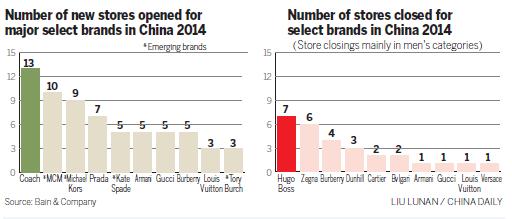

As McKinsey has found out, the Chinese middle class is willing to spend more time and money on recreational activities and tourism. Products or services which stress emotional and social aspects will gain more preference. Meanwhile, the Chinese middle class is becoming more inclined to overseas brands.
The continued growth of the Chinese middle class, especially the upper-middle class, will lead to a "more mature and attractive" market for businesses, according to the consulting firm.
As a result, overseas brands, especially those in the fast fashion industry, are seeking rapid development in China.
Japan's Uniqlo is undoubtedly the most aggressively expanding fast fashion brand in China. As of the 2014 fiscal year which ended on Aug 31, the company had a total of 374 stores in China, among which more than 80 had opened last year. Last year, during the Chinese online shopping carnival Singles' Day-which falls on Nov 11 every year-Uniqlo came out on top among garment companies, notching up online sales revenue of 260 million yuan.
Swedish fashion giant H&M also saw its net profits rise 17 percent to 19.98 billion kronor ($2.44 billion) in 2014 while sales increased 18 percent to 176.62 billion kronor.
The strong earnings came on the back of massive expansion, with the chain adding 379 stores in 2014, mainly in the United States and China, bringing its total network to more than 3,500 outlets in 55 countries and regions. New online stores in France, Spain, Italy and China also posted strong returns, the group said, adding that similar launches are planned for eight European countries in 2015.
"The year 2014 has been a very good year for H&M. Well-received collections for all our brands and continued strong expansion both in stores and online have helped increase our market share," Chief Executive Karl-Johan Persson said.
US sportswear manufacturer Columbia saw its sales grow by 15 percent to $79.8 million last year, with incremental net sales of about $44.1 million coming from the company's joint venture in China.
Tim Boyle, Columbia's president and chief executive officer, said that "2014 was an outstanding year for Columbia Sportswear Company". Looking forward to 2015, the company expects operating profit to grow at a rate faster than sales growth.
Luxury brands lose their shine
With a slowdown in the country's economic growth and the ongoing campaign against extravagance across China, sales of luxury brands took a hit in 2014.
According to market consultancy firm Bain & Company, Chinese consumers spent a total of 1.2 billion yuan ($191.7 million) on men's luxury apparel in 2014, half the amount recorded the previous year. The top five brands were Armani, Hugo Boss, Burberry, Dior and Ermenegildo Zegna, among which Hugo Boss saw its ranking rise in 2014 and Dior made it to the list for the first time.
Chinese consumers spent a total of 6.7 billion yuan on women's luxury apparel last year, up 700 million from a year earlier. However, little change was witnessed in terms of the ranking of the top five brands. Armani, Burberry, Chanel, Dior and MaxMara retained the top five positions in 2014. At the same time, some established luxury brands had to close some of their stores in China last year. According to Bruno Lannes, a partner with Bain, the established brands' conservative attitude toward store opening and their store closures were mostly due to a weaker performance in menswear categories and negative like-for-like sales growth for most brands.
"Brands are now more stringent in store selection and focus on new or replacement openings of larger flagship stores due to declining like-for-like sales. Several brands slowed the pace of new openings in 2014, consolidating their exposure and closing smaller satellite locations in lower-tier cities," Lannes said.
Luxury homes make comeback in China
2015-02-27Luxury labels embrace ‘new normal‘ as Chinese market shrinks
2015-02-25Luxury sales sag in corruption-plagued Shanxi
2015-02-1676% of China‘s luxury consumption happens overseas
2015-02-01China‘s luxury market shrinks in 2014
2015-01-22Spending on luxury falls on mainland
2015-01-21Copyright ©1999-2018
Chinanews.com. All rights reserved.
Reproduction in whole or in part without permission is prohibited.